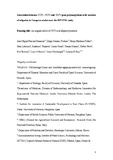Mostrar el registro sencillo del ítem
Association between UCP1, UCP2, and UCP3 gene polymorphisms with markers of adiposity in European adolescents: The HELENA study
| dc.creator | Pascual Gamarra, José Miguel | es_ES |
| dc.creator | Salazar-Tortosa, Diego | es_ES |
| dc.creator | Martínez Téllez, Borja | es_ES |
| dc.creator | Labayen Goñi, Idoia | es_ES |
| dc.creator | Rupérez, Azahara I. | es_ES |
| dc.creator | Censi, Laura | es_ES |
| dc.creator | Manios, Yannis | es_ES |
| dc.creator | Nova, Esther | es_ES |
| dc.creator | Gesteiro, Eva | es_ES |
| dc.creator | Moreno, Luis A. | es_ES |
| dc.creator | Meirhaeghe, Aline | es_ES |
| dc.creator | Ruiz, Jonatan R. | es_ES |
| dc.date.accessioned | 2019-06-25T11:34:37Z | |
| dc.date.available | 2019-12-03T00:00:17Z | |
| dc.date.issued | 2019 | |
| dc.identifier.issn | 2047-6302 | |
| dc.identifier.uri | https://hdl.handle.net/2454/33484 | |
| dc.description.abstract | Aims: To examine the association between UCP1, UCP2, and UCP3 gene polymorphisms with adiposity markers in European adolescents and to test if there were gene interactions with objectively measured physical activity and adiposity. Methods: A cross-sectional study that involves 1.057 European adolescents (12-18 years old) from the Healthy Lifestyle in Europe by Nutrition in Adolescence Cross-Sectional Study. A total of 18 polymorphisms in UCP1, UCP2, and UCP3 genes were genotyped. We measured weight, height, waist, and hip circumferences and triceps and subscapular skinfold thickness. Physical activity was objectively measured by accelerometry during 7 days. Results: The C allele of the UCP1 rs6536991 polymorphism was associated with a lower risk of overweight (odds ratio [OR]: T/C + C/C vs T/T) = 0.72; 95% confidence interval [CI]: 0.53-0.98; P = 0.034; false discovery rate [FDR] = 0.048). There was a significant interaction between UCP1 rs2071415 polymorphism and physical activity with waist-to-hip ratio (P = 0.006; FDR = 0.026). Adolescents who did not meet the physical activity recommendations (less than 60 min/day of moderate to vigorous physical activity) and carrying the C/C genotype had higher waist-to-hip ratio (+ 0.067; 95% CI, 0.028-0.106; P = 0.003), while no differences across genotypes were observed in adolescents meeting the recommendations. Conclusions: Two UCP1 polymorphisms were associated with adiposity in European adolescents. Meeting the daily physical activity recommendations may overcome the effect of the UCP1 rs2071415 polymorphism on obesity-related traits. | en |
| dc.description.sponsorship | European Community Sixth RTD Framework Programme, Grant/Award Number: FOOD‐CT‐2005‐007034; Spanish Ministry of Education, Grant/Award Numbers: AP2006–02464, EX‐2008‐0641 and EX‐2007‐1124; Spanish Ministry of Health, Grant/Award Number: RD08/0072; Swedish Council for Working Life and Social Research, and the ALPHA study, Grant/Award Numbe r: 2006120; Maternal, Child Health, and Development Network of the Spanish Ministry of Health, Grant/Award Number: RD08/0072; Spanish Ministry of Economy and Competitiveness (DEP2016‐79512‐R), Fondos Estructurales de la Unión Europea (FEDER), and the University of Granada, Plan Propio de Investigación 2016, Excellence actions: Units of Excellence; Unit of Excellence on Exercise and Health (UCEES); Spanish Ministry of Education, Grant/Award Numbers: FPU13/03410 and FPU16/02127. | en |
| dc.format.extent | 22 p. | |
| dc.format.mimetype | application/pdf | en |
| dc.language.iso | eng | en |
| dc.publisher | Wiley | en |
| dc.relation.ispartof | Pediatric Obesity 2019;14:e12504 | en |
| dc.rights | © 2019 World Obesity Federation | en |
| dc.subject | Adolescents | en |
| dc.subject | Brown adipose tissue | en |
| dc.subject | Genetic susceptibility | en |
| dc.subject | Uncoupling protein | en |
| dc.title | Association between UCP1, UCP2, and UCP3 gene polymorphisms with markers of adiposity in European adolescents: The HELENA study | en |
| dc.type | info:eu-repo/semantics/article | en |
| dc.type | Artículo / Artikulua | es |
| dc.contributor.department | Institute on Innovation and Sustainable Development in Food Chain - ISFOOD | es_ES |
| dc.contributor.department | Ciencias de la Salud | es_ES |
| dc.contributor.department | Osasun Zientziak | eu |
| dc.rights.accessRights | info:eu-repo/semantics/openAccess | en |
| dc.rights.accessRights | Acceso abierto / Sarbide irekia | es |
| dc.embargo.terms | 2019-12-03 | |
| dc.identifier.doi | 10.1111/ijpo.12504 | |
| dc.relation.projectID | info:eu-repo/grantAgreement/ES/1PE/DEP2016‐79512 | en |
| dc.relation.publisherversion | https://doi.org/10.1111/ijpo.12504 | |
| dc.type.version | info:eu-repo/semantics/acceptedVersion | en |
| dc.type.version | Versión aceptada / Onetsi den bertsioa | es |


